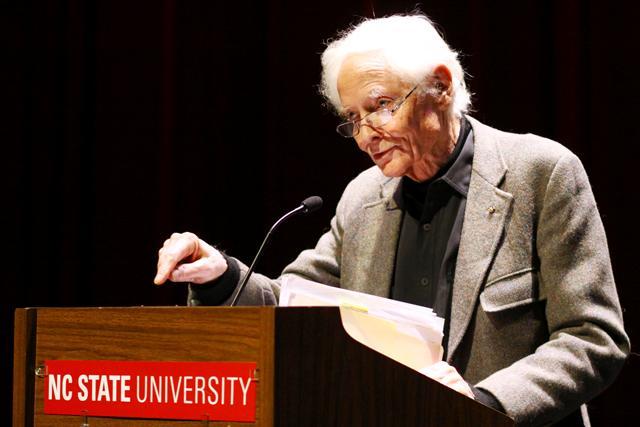William Stanley Merwin made his last official appearance as the nation’s Poet Laureate at a reading in Stewart Theatre Monday. The event was sponsored by N.C . State’s Creative Writing Program.
Director of the Program, John Balaban , has known Merwin over a span of almost 30 years.
“[ Merwin ] was a speaker at the American Literary Translation Association, which I was president of then,” said Balaban .
Still, it took a fair amount of organizing to get a Poet Laureate – the most prestigious honor given to a writer by the U.S . government – to come to N.C . State.
“We contracted him last year [through his agency],” said Balaban , “N.C . State came up with the fee. [However,] his contract stipulates that we can’t reveal the actual number.”
The Creative Writing Program hosts several events on campus each year, which typically include three fictional writing and three poetry readings.
“We have the best public readings in the state, maybe in the whole south. We have a great MFA [Master of Fine Arts] faculty that has contacts for our readings,” Balaban said.
At a pre-event Q&A Monday, Merwin shared anecdotes about what inspired many of his poems.
“Of all the things in the visual art I’ve ever seen, the one that I remember was most incredible…is standing in the doorway of the room where…the painting of a girl pouring [a] pitcher of milk is across the room and seeing that just took my breath away,” Merwin said, “But I have the impression that when I looked at it the first time, the whole world, everything I knew about the world, was right there in that two inches of paint.”
Merwin , winner of two Pulitzer Prizes for poetry, is known for his largely free verse poems that range from political themes to nature and its immensity.
With a grave yet fluid tenor, he first recited, “Summer,” “The Wilderness,” and “Dusk in Winter,” all of which he wrote in his early 30s.
Merwin also read poems that emphasized setting, or “place,” in response to audience questions.
“Earlier today, I talked to some remarkable people, who asked some remarkable questions, about the sense of ‘place’ [which is] weakening,” Merwin said.
In response to this, Merwin read poems such as “September Plowing” and “The Love for October,” both of which exemplified a strong sense of ‘place.’
Merwin also talked a bit of his home life in Hawaii in between readings.
“I don’t know how you all feel about rain here in North Carolina…but in Hawaii, we love the rain. Sometimes I’ll sit up at night and just listen to the rain,” said Merwin.
N. C. State’s Stewart Theatre was filled with students, faculty, and alumni, all of whom applauded Merwin as the reading concluded.
“He’s one of the most important American poets,” said Balaban, “We should be honored [to have him].”
Philip Levine will be taking over as the U.S. Poet Laureate in mid-October.








